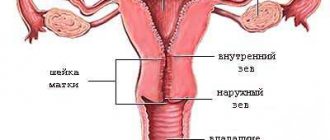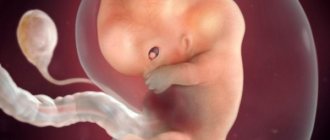The walls of the uterus are muscle tissue, which, like other muscles in the body, can be tense or relaxed. But even at complete rest, any muscle retains some tone, which increases during exercise and then decreases again.
If you hear the diagnosis “uterine tone,” this means that we are talking about a condition in which the muscle tissue of the organ is excessively tense. This clearly affects the woman’s well-being and the development of the fetus. The condition persists for a long time and is observed more often than natural contractions of the uterus. Its other name is hypertonicity.
How to suspect uterine tone
You should be alerted by nagging or sharp pains in the lower abdomen, especially if they are accompanied by vaginal discharge mixed with blood. Signs of hypertonicity may vary slightly depending on the gestational age.
Uterine tone: symptoms in early pregnancy
- Pain and feeling of tension in the pelvic area.
- Unusual discharge – clotted or brown.
Hypertonicity in the 1st trimester is rare. Usually accompanied by severe disturbances in the development of pregnancy: miscarriage or threatened miscarriage, improper implantation of the fertilized egg, fetal death. With timely treatment in a hospital, pregnancy can be saved.
Symptoms of uterine tone during pregnancy in the 2nd and 3rd trimester
- Pain in the lumbar region and lower third of the abdomen.
- Unusual vaginal discharge: heavy, red or streaked with blood. They indicate the onset of placental abruption.
- The abdomen thickens and rises, which is noticeable not only to the doctor, but also to the woman herself.
If there is a tone along the posterior wall of the uterus during pregnancy, then in addition to the signs already listed, there is also a disturbance in stool, frequent bowel movements, and a feeling of fullness in the perineal area. With the tone of the anterior wall of the uterus, a pregnant woman may be bothered by frequent urination.
How to determine tone and distinguish it from natural contractions
In the 2nd and 3rd trimester of pregnancy, pain in the lower abdomen may not be associated with pathology. This is a time of active growth of the uterus, when a significant load is placed on its ligamentous apparatus. The ligaments are stretched, which causes discomfort in the pregnant woman. In the 3rd trimester, discomfort is associated with training contractions.
But unlike physiological ones, uterine contractions with increased tone last longer, the pain is brighter and more intense. A pregnant woman experiences severe heaviness and a feeling as if her stomach is turning to stone. It really feels hard to the touch. This condition does not go away on its own and causes increased anxiety in the expectant mother. Often she intuitively understands that “something is wrong.” And, of course, neither training contractions nor stretching of the uterine ligaments can provoke bleeding.
Increased uterine tone at different stages of pregnancy
Pregnant women experience major adaptive changes in anatomy, physiology and the functioning of internal organs, which determine the normal course of pregnancy and successful childbirth.
The uterus, which has three layers: outer serous, inner epithelial, intermediate muscular - myometrium, undergoes radical changes. The middle layer is quite elastic, which allows it to stretch and contract during childbirth and return to its previous state after childbirth. However, against the background of the development of certain factors, contractile activity of the uterus may appear earlier than expected.
Various symptoms appear in the form of heaviness or nagging pain in the lower abdomen; in such cases, uterine hypertonicity is often diagnosed. Such a diagnosis is not a reason to panic, but this condition should not be considered the norm, so you need to make an appointment with a gynecologist as soon as possible.
How is uterine tone diagnosed?
When making a diagnosis, the gynecologist is based on the patient’s collected medical history and examination data. In the 2nd and 3rd trimesters of pregnancy, when the uterus rises above the navel, the gynecologist can identify the tone “with his hands” through the anterior abdominal wall.
The pregnant woman lies on the couch, lying on her back and bending her knees. This position relaxes the abdominal muscles as much as possible and allows for diagnostics. Normally, the abdomen should be soft, the gynecologist will be able to feel parts of the fetal body. With increased tone, the uterus is very tense, even to the point of feeling a stone under your hand.
Using ultrasound, you can determine local or total thickening and swelling of the muscular layer of the uterus. An ultrasound will also allow you to assess the condition of the fetus by measuring its heartbeat. In the later stages, fetal CTG data helps indirectly confirm the tone of the uterus.
Diagnosis of hypertension and related diseases
There are several methods for diagnostic confirmation of the presence of hypertonicity. Ultrasound examination is considered the simplest and most accessible. Ultrasound allows you to assess the condition of the uterine muscles, determines possible pathological processes and directly indicates ongoing hypertonicity.
Another, more modern method of determining tone is tonusometry. The essence of the diagnostic method is that sensors are placed on the woman’s stomach, which send a signal to a special device that visualizes the presence of tone.
If hypertension is confirmed, the doctor prescribes a number of additional studies:
- General clinical analysis of blood and urine
- Determination of hormone levels in the blood
- Diagnostics of blood clotting
- Research for STDs
Why does hypertension occur?
The causes of uterine tone during pregnancy may be:
- deficiency of progesterone, which is responsible for muscle relaxation and embryo implantation;
- diabetes mellitus and thyroid disorders;
- anomalies in the structure of the organ - bicornuate uterus, adhesions, bend;
- polyhydramnios or oligohydramnios, multiple pregnancies and large fetuses;
- fibroids, endometriosis, polycystic disease;
- autoimmune pathologies and Rh-conflict pregnancy;
- lack of magnesium, iron, folic acid;
- ARVI and influenza accompanied by high fever.
Pathological tension of the uterus occurs due to stress and prolonged emotional tension, increased anxiety and depression. In this case, the concentration of adrenaline and cortisol, hormones that affect the state of the smooth muscles of the uterine walls, increases. That is why it is so important for the expectant mother to be in a good mood, not to worry and sleep at least 8 hours a day. Lack of sleep also contributes to the production of stress hormones and affects tone.
Harmful factors also include working conditions. Prolonged stay in a static position, excessive physical activity and heavy lifting, shift work or daily work, interaction with chemicals, long business trips and travel - all this has a pathological effect on the health of the woman and the fetus.
Among the reasons that indirectly affect the appearance of uterine tone, we note:
- Bad habits.
The condition is more often observed in women who smoke.
- Bowel function.
Due to its close location to the uterus, increased peristalsis provokes uterine contractions. Therefore, it is so important to eat right and eliminate constipation during pregnancy.
- Age of the expectant mother.
Uterine tone occurs more often in pregnant women under 18 and over 35 years of age.
- History of abortions and miscarriages.
Reasons for the development of tone
- Progesterone
, or rather its deficiency. This hormone is formed before the 4th month by the corpus luteum. During pregnancy, its function is to eliminate the development of uterine tone.
Basically, a lack of progesterone occurs in the first stages of pregnancy, but the pathology can be diagnosed throughout the entire period. In the second stage of pregnancy, this may be due to the fact that the expectant mother is still working, tired and nervous. At the third stage, the reasons may be different.
Thus, if there is not enough progesterone, then hypertension is possible, so the hormonal status should be monitored by a doctor.
- Toxicosis.
Abundant toxicosis affects the condition of the uterus. During toxicosis, frequent vomiting occurs, so the body muscles contract.
It is very important that a woman can understand whether she has severe toxicosis or not, in order to contact a gynecologist in time to manage the pregnancy.
- Rhesus conflict.
It occurs when the blood of the parents does not match, for example, the mother’s Rh factor is negative, and the father’s is positive. A woman's body may refuse to accept the fetus.
- A disease caused by infection or inflammation in the uterus
. Signs of the disease: pain in the lower abdomen, itching, discharge.
To prevent problems with health and pregnancy from becoming a dangerous surprise, you need to be observed throughout your pregnancy in the clinic and discuss all your problems with an obstetrician-gynecologist.
What are the consequences of tone
With hypertonicity, the pressure inside the uterus increases, as a result of which blood supply deteriorates, and the child begins to experience oxygen starvation.
Without timely medical care, high uterine tone leads to:
- disturbances in the development of the fetus - with a lack of oxygen and nutrients, first of all, the brain and nervous system suffer;
- placental abruption;
- early miscarriage or premature birth in the 2nd or 3rd trimester.
Therefore, with increased uterine tone during pregnancy, special therapy is necessary.
What is the uterus and tone
The uterus is the female reproductive organ. Divided into three layers:
- The perimeter is a layer of the mucous membrane. Covers the outer layer of the uterus with a thin film.
- The myometrium is the second layer consisting of fibers and muscle tissue.
- The endometrium is the layer of lining that is found inside the uterus.
The myometrium is a membrane that can contract, as during childbirth. The tone of the uterus is usually called the state when this muscle is in a relaxed position.
If the tone is increased, then the uterus begins to contract, as a result of which premature birth may occur, or even worse, it may be a miscarriage. Therefore, let’s look at what the signs and symptoms of this condition are and how to treat the pathology.
How to help yourself with tone
If you experience symptoms of uterine tone, you should immediately call an ambulance or go to the hospital yourself. While you wait for the doctor, lie on your side or get on all fours, supporting yourself on your forearms. This is the so-called cat pose, which allows you to relax your muscles.
Breathing exercises will also help with tone: breathe on a count so that the exhalation is twice as long as the inhalation. For example, inhale for 3 counts, exhale for 6 counts. Drug therapy is selected by a specialist. Sedatives, drugs that relieve spasms, as well as B vitamins and magnesium are usually used.
Depending on the patient’s condition, if there is increased tone, hospitalization may be prescribed, the advantages of which are:
- constant monitoring by medical personnel;
- bed rest;
- the use of methods that are not available for home treatment, primarily intravenous drips and injections.
Treatment
A gynecologist, examining a woman, assesses the risks of miscarriage. If they are high, the doctor prescribes medications that relieve muscle tension. If the uterine tone is small, you can do without medications.
In the treatment of uterine tone, the psycho-emotional state of the pregnant woman plays an important role.
First of all you need:
- Don't be nervous, relax and be calm;
- Do not engage in anything related to physical activity;
- Maintain a daily routine;
- Eat properly;
- Get rid of bad habits.
The most common exercise to strengthen uterine tone at home is the “Cat”. It will help you relieve tension and normalize the tone of the uterus.
You should get on all fours, raise your head and bend your back. Secure in this position, and then slowly return to its original state. This exercise can be done several times a day. Even if everything is fine and there are no signs, you can use the technique for prevention.
Pregnancy is probably the most beautiful stage in the life of every woman. But if any alarming symptoms occur, it is better to immediately consult a doctor. Self-medication in this case can aggravate the situation and cause irreversible consequences.
How to prevent increased tone
The health of a woman and her fetus depends on many conditions. Therefore, there is no universal way to prevent increased tone. However, by following a number of recommendations, you can significantly reduce the risk of developing such a complication and make your pregnancy more enjoyable:
- Try to sleep at least 8 hours, eat nutritiously and avoid stressful situations.
- Be moderate in physical activity and avoid overwork.
- Monitor the level of magnesium in the blood, discuss with a specialist the need to take vitamin complexes.
- Do not forget to promptly visit the gynecologist managing your pregnancy, especially if it is complicated by chronic diseases.
Entrusting the management of pregnancy to the specialists of the Medical Women's Center means making a valuable contribution to the health of the unborn child. We approach each of our patients very carefully and do everything possible to prevent the development of complications during pregnancy.
Reasons for changes in tone in the uterus
Identifying the cause of uterine hypertonicity is an important point on which the quality of the treatment depends.
The first or second ultrasound during pregnancy will allow you to see changes in muscle tension in the organ, but does not allow you to determine its nature. To verify the cause of the pathology, the obstetrician-gynecologist conducts a comprehensive examination of the expectant mother. A complete list of necessary procedures can be completed in a multidisciplinary department. Possible causes of uterine hypertonicity:
- hormonal imbalance;
- infectious diseases;
- somatic pathology (diseases of the cardiovascular, urinary or other systems);
- stressful situations.
The risk of developing increased tension in the muscles of the uterus increases if a woman faced the same problem during her previous pregnancy. Characteristic changes in the muscles of the organ can be recorded when the first ultrasound is performed during pregnancy. A provoking factor in the occurrence of pathology is also the genetic predisposition and individual characteristics of the body of the expectant mother.
Main causes
What is increased uterine tone and why does it occur? Today, there are 9 main reasons that provoke hyperexcitability of smooth muscles.
- Hormonal background. An insufficient amount of the hormone progesterone, as well as an excess of prolactin, is the main cause of hypertension.
- Pathology in the field of gynecology:
- underdevelopment (infancy). It is a congenital underdevelopment of the reproductive system, accompanied by a small size of the uterus and other reproductive organs;
- endometriosis as a cause of uneven contraction;
- fibroids localized in the myometrial layer. negatively affects fetal growth.
- Early toxicosis and late gestosis, accompanied by complications. This factor causes electrolyte imbalance.
- Rhesus conflict between mother and fetus. When a woman is Rh negative and a man is Rh positive, there is a high percentage that the unborn child will inherit the father's Rh. Thus, the mother’s body perceives the fetus as a foreign body and causes contraction at the immunological level.
- Past infections. Inflammatory foci that form during any infectious process cause a restructuring of balanced metabolism, and this is a trigger for hyperexcitability.
- Severe stretching of the organ. The reason for this is multiple pregnancy and polyhydramnios.
- Frequent stressful situations. In this case, the concentration of adrenaline and cortisol levels increases.
- Mechanical impact. This includes trauma and high-intensity sexual intercourse.
How do you know that the uterine tone is increased? In addition to the above, increased tone during pregnancy may occur due to secondary factors:
- problems with stool;
- active intestinal motility;
- severe distension of the bladder. This may be caused by acute urinary retention.
Treatment of hypertension
Outpatient treatment
Treatment of hypertonicity on an outpatient basis is possible only in cases where there is no direct threat to the life of the fetus, if there are no complications such as bleeding from the genital tract and fetal hypoxia, if the patient’s complaints are intermittent and do not cause the woman significant discomfort, if the woman is able to organize at home conditions for yourself, a gentle physical and emotional regime.
To eliminate hypertension in the first trimester of pregnancy, antispasmodics (Papaverine suppositories), sedatives (Valerian tablets, Motherwort tincture), and Magne-B6 preparations are prescribed.
Photo: https://pixabay.com/photos/medical-health-drug-tablets-1902006/
If the cause of hypertension is a hormonal disorder, gestagens (Duphaston, Utrozhestan) are indicated, the course of administration is determined by the doctor. If an infectious process is detected, antibacterial drugs are prescribed. In any case, when one or another cause of hypertonicity is identified, the doctor’s actions are aimed at combating the unfavorable factor that creates the preconditions for the occurrence of increased uterine tone.
In the second trimester, treatment is similar to the first trimester, but prevention of fetoplacental insufficiency (FPI) and fetal hypoxia (Curantil, Chofitol) is also indicated. In the third trimester, it is possible to prescribe tableted beta2-adrenergic agonists (Ginipral), and wearing a bandage is indicated. Therapy is prescribed to improve placental function (Hofitol)
The woman is shown peace in all respects. Both physically and psychologically, a pregnant woman must be balanced; sexual activity is excluded.
Hospital treatment
If uterine hypertonicity is intense and regular, accompanied by bloody discharge from the genital tract, if the fetus suffers (hypoxia is diagnosed), if a woman cannot organize a full protective regime for herself at home, if there is a direct threat of miscarriage or premature birth, then the woman should be hospitalized .
Therapy in a hospital in the first trimester of pregnancy consists of prescribing antispasmodics (Papaverine hydrochloride intramuscularly, Baralgin for severe pain), sedative therapy (Monwort tincture, Valerian tincture, Magne-B6).
In case of hormonal imbalance, synthetic hormonal drugs are prescribed (Utrozhestan, Duphaston, Progesterone for intramuscular administration, Menten, Pregnyl, Dexamethasone for hyperandrogenism). Bloody discharge is eliminated with hemostatic agents (Vikasol, Etamzilat). In order to correct the rheological properties of blood, Acetylsalicylic acid, Pentoxifylline, Dextran, and Heparins are often prescribed. Often, when organizing hematon after chorionic detachment, Wobenzym is indicated.
In the second trimester of pregnancy, surgical correction of ICI (isthmic-cervical insufficiency) is added according to indications. Anemia is treated if it is present (Ferretab, Ferrum Lek, Sorbifer). In order to improve the trophic function of the placenta and to prevent fetal hypoxia, Chofitol, Curantil, and vitamin complexes are prescribed. Magnesium sulfate is most often prescribed among antispasmodics.
Photo: https://pixabay.com/vectors/vitamins-tablets-pills-medicine-26622/
In the third trimester, you can add beta mimetics (Hexoprenaline, Ginipral, Verapamil along with tocolytics).
The expectant mother is given physical and psychological rest, consultation with a psychologist or psychotherapist.
To treat or not to treat uterine tone during pregnancy?
An obvious question with a non-obvious answer. It all depends on certain factors, such as the duration of pregnancy, the frequency and duration of the tone, and most importantly, on the reason that causes this tone. If the tone threatens the unborn child, then naturally it needs to be treated, but such a decision can only be made by a gynecologist.
If the tone is accompanied by pronounced pain or unusual discharge, you should immediately consult a doctor.
In case of hospitalization and severe hypertension, doctors will try to deal with it promptly. For this purpose, electrophoresis with magnesium and other types of electrical stimulation are used. For severe toxicosis that provokes hypertonicity, endonasal galvanization is used.
If the doctor determines that the expectant mother is able to cope with the tone of the uterus herself, outpatient treatment is prescribed. Most often, doctors prescribe mild sedatives and antispasmodics. If there is a lack of progesterone, hormonal drugs are prescribed. Naturally, a pregnant woman is recommended to have complete rest, bed rest and the absence of any stressful situations5.
Effective treatments
When entering the hospital to eliminate increased tone, a woman first undergoes diagnostics, based on the results of which the doctor draws up a treatment plan. Today, the answer to the question of how to treat uterine hypertonicity is the use of medications.
Among the main medications are:
- hormonal substances;
- antispasmodics;
- preparations containing magnesium.
Also, the main advice on relieving uterine hypertonicity is to adhere to strict bed rest, walk in the fresh air, take sedative medications (as prescribed by a doctor) and control sugar, heart rate, and blood pressure.
In addition, in order to protect yourself from the reoccurrence of the problem, you should consult a doctor about nutrition and find out which foods increase the tone of the uterus. Among the main ones are:
- drinks containing caffeine, including strong tea;
- blue cheese;
- seafood that cannot be processed;
- eggs;
- alcoholic drinks.
Now that you know what you shouldn’t do if you have uterine hypertonicity, you can safely exclude forbidden foods from your diet and protect yourself from possible pathologies.
general description
“What is uterine hypertonicity?” is a question that worries many pregnant women. This is increased muscle excitability, which is provoked by hormonal changes and negative psychophysiological factors. There are two categories of women at risk.
- Young, under 18 years of age. In this case, the pathology occurs due to underdeveloped reproductive organs and physiological unpreparedness for gestation and birth of a fetus;
- Mature, over 30 years old. In such women, increased stimulation of smooth muscles is caused by frequent abortions, previous infectious diseases and other gynecological pathologies.
Increased uterine tone, what to do? Hyperexcitability is a real threat to the normal development and health of the child. It is caused by a high risk of fetal hypoxia, termination of pregnancy (spontaneous miscarriage), premature birth with possible death for the baby.
What factors are responsible for normal uterine tone and pregnancy preservation?
The uterus is a natural hollow muscular reservoir for the development and bearing of offspring.
Like any muscular organ, the uterus is capable of contraction. It is necessary to understand that hypertonicity is bad, but simply tone is an indicator of the norm. The uterus itself is represented by three layers: mucous (endometrium), directly muscular (myometrium) and serous (perimetry). The myometrium is the main structural part of the uterus as an organ; it is a plexus of bundles of smooth muscle fibers, which are arranged in layers in different directions, among which there are islands of connective tissue and elastic fibers. The myometrium is well supplied with blood and plays a key role in uterine contraction during childbirth.
In a non-pregnant state, the uterus contracts during menstruation, thereby facilitating the complete release of blood and parts of the exfoliated endometrium from the cavity. During pregnancy, the main task of the uterus is to preserve the fetus, allow it to develop and mature, and when the task is completed, facilitate the birth of the baby through intense contractions.
Progesterone is an amazing hormone, the concentration of which progressively increases in the mother's body with the onset of pregnancy. It is he who guards the well-being of the tone of the uterus, acting relaxing on the smooth muscles. The uterus is soft, the volume is sufficiently normal, and the fetus is not in danger of premature expulsion. Excessive maternal anxiety is also “extinguished” by progesterone through its effect on the central nervous system.
What is the danger of uterine hypertonicity?
Before 22 weeks of pregnancy, uterine hypertonicity can cause spontaneous miscarriage. Dangerous massive bleeding may develop.
After 22 weeks of gestation, hypertonicity can provoke premature birth. The longer the period, the higher the chances of a newborn baby to survive. There remains a high risk of dangerous bleeding.
Fetal hypoxia can result from prolonged and frequent hypertonicity. Blood circulation is disrupted, nutrients and oxygen are not fully supplied to the fetus, which can contribute to its malnutrition and developmental delays.










